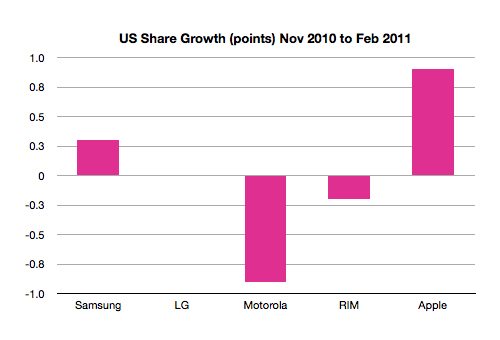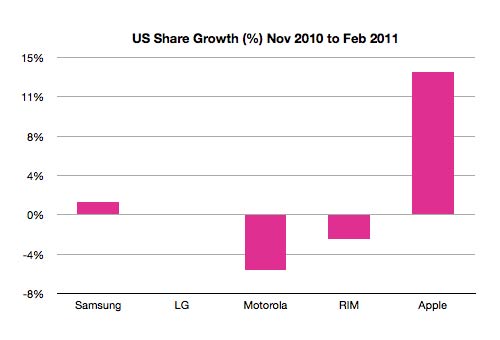iOS versus Android: OS Footprint is not a Proxy for Application Footprint
This analysis by Henry Blodget on Business Insider makes the classic (repeated ad-nauseum) mistake of putting Apple in a race they’re not in. Apple does not make a third party OS platform for phones. It makes phones and it makes an application platform for developers. What he is implicitly doing is using OS footprint as a proxy for app platform footprint, and at this point in the mobile market’s evolution, that is just wrong headed.
First of all, it distorts the reality of what’s happening in the handset market. Blodget makes a lot of Android versus iOS growth, but taking the Comscore numbers that he uses, look at the growth in the top OEMs over the last quarter. Among Apple’s phone competitors in the top 5 OEMs (by share of mobile subscribers), only Samsung shows positive growth. And that is one third of Apple’s growth.
Now, Blodget shows the growth in share points, but the difference between the OEMs is much more stark if one looks at percentage growth. Apple’s share grew almost 14% (from 6.6% to 7.5%) whereas Samsung, the fastest growing of the top Android OEMs, grew only 1% (from 24.5% to 24.8%). The take away from this is that of the top OEMs, only Apple is growing faster than the overall handset market in the US.
Blodget doesn’t focus here though. How could he? His headline says “iPhone [is] dead in [the] water”. Instead he focuses on OS share. He shows Android’s share of the OS market increasing 27% (from 26% to 33%) and the iOS share increasing 1% (from 25% to 25.2%). So the number of phones running Android is increasing a lot faster than the number of phones running iOS.
All of this does beg the question, where is the Android growth coming from? I think it is useful to think about the growth in terms of two components.
- The top OEMs, Samsung, LG and Motorola, as their internal mix shifts away from other platforms to Android. Comscore’s data says that 30% of mobile users are on smartphones, which means that Android’s 7 points of growth over the last 3 months corresponds to about 2 points of growth relative to phones overall. As OEMs double down on Android, they are replacing Windows Mobile and Symbian phones with Android phones, and high end feature phones with Android phones. Brand loyal customers will switch along with them. Are these customers all hungrily after a fantastic app platform? No, a lot of them are just getting their next phone.
- The rest: OEMs that aren’t in the top 5. Up and comers like HTC and lots of other smaller OEMs. When I looked at the Android market last November, there were roughly 80 phones in market and that number had doubled year on year. I’m pretty sure that the number is a lot higher today. I theorize that the smartphone market is growing way faster than Apple can handle (without compromising their quality/service bar) and a proliferation of Android phones are finding their way into the hands of new-to-smartphone users. People who don’t want to let go of the physical keyboard, or want a slightly smaller or larger screen, or who take advantage of one of the free phone of BOGO offers that are often available for low end Android phones, or who can’t get an iPhone on their mobile network operator.
In both of these situations, even the most die-hard Android supporter would have to admit that the quality of the growth, measured by the customer’s intent to exploit the benefits of their phone and make full use of it as an app platform, is vastly different between Android and iOS. Every new iPhone user knows what they’re buying into. Many Android users have no idea that their phones even run apps.
Blodget doesn’t mention anything like this. He mentions the OEM share in passing, and then locks on to one simple number: The OS footprint. It is a simple number, and it supports his narrative.
Here’s the thing though: OS footprint comparisons are irrelevant from an application footprint point of view if people with new Android phones can’t or don’t embrace apps on their phones. The only place it matters is in articles like the one Blodget wrote. If anything, this explosion of Android devices will have a negative impact on the chances of Android having an app ecosystem as exciting as the one around iOS. Every new Android model makes it harder for Google to control this monster of an ecosystem that they have created and ensure a consistently good user experience across handset models.
So while it is completely valid to compare the footprint of two different application platforms, comparing Android’s fragmented story with iPhone’s ordered iOS platform is either intentionally misleading or completely ignorant. It implies that all else is equal, when clearly this isn’t the case. As an application platform, Android has a long way to go.
There are valid ways to measure the progress of an application platform and they involve (surprise!) the apps. Where are most of the new apps appearing? Where are developers making the most money? Which platform’s users are using more apps? By any of these measures the iPhone is leaving other app platforms behind.
But what of the trend? Isn’t Android on a path to rectify this situation and become a competitive app platform? Yes, things will probably improve. But its not exactly plain sailing. Samsung is hedging its bets with Windows Phone 7, and Motorola is building its own OS capability. Neither of these strategies are likely to do them much good, but the point is that they have anything but razor sharp focus on making the best Android-based phones the world has ever seen.
Here’s the best evidence that platform fragmentation is an issue and general quality of Android-based phones is lacking: Google’s recent actions to clamp down on the ecosystem. I’m not in the camp that believes this was an intentional bait and switch by Google. I think they started out with the goal of being open, but they are learning that this approach doesn’t work in the world of phones where tight tolerances on user experience require much more coordination between hardware and software.
I wish that analysts like Blodget would look at this market from the point of view of the things consumers care about and make decisions about. Phones and apps. I’m not even arguing that iOS will beat Android in the long term, I’m just appealing to analysts: Please, lift your game. Go beyond grabbing the simplest number you can find and using it as the basis for useless, potentially misleading conclusions.
Posted: April 2nd, 2011 under Flat Out Wrong, Mobile.
Pingbacks/Trackbacks
[…] Much more in the full article – highly recommended – here. […]



My mobile views » Flashes of Greatness (sometimes anyway) said on April 7, 2011 at 2:16 am
[…] – meaning iPads, iPods, and iPhones. That my friend, would fun. Here is another great article explaining the rationale around what I am trying (unsuccessfully) to point […]